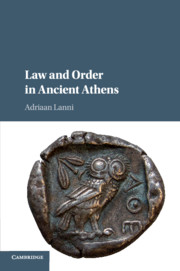Book contents
- Frontmatter
- Dedication
- Contents
- Acknowledgments
- List of Abbreviations
- Introduction: The Puzzle of Athenian Order
- PART ONE
- PART TWO
- THREE The Expressive Eff ect of Statutes
- FOUR Enforcing Norms in Court
- FIVE Court Argument and the Shaping of Norms
- SIX Transitional Justice in Athens: Law, Courts, and Norms
- Conclusion
- Bibliography
- Index
FIVE - Court Argument and the Shaping of Norms
from PART TWO
Published online by Cambridge University Press: 05 August 2016
- Frontmatter
- Dedication
- Contents
- Acknowledgments
- List of Abbreviations
- Introduction: The Puzzle of Athenian Order
- PART ONE
- PART TWO
- THREE The Expressive Eff ect of Statutes
- FOUR Enforcing Norms in Court
- FIVE Court Argument and the Shaping of Norms
- SIX Transitional Justice in Athens: Law, Courts, and Norms
- Conclusion
- Bibliography
- Index
Summary
The mechanism for fostering order that I described in the previous chapter – enforcing extralegal norms through formal court processes – focused on norms that were relatively stable and uncontroversial. But what about norms that were unclear or in flux? Arguments in Athenian courts not only reinforced existing norms but also helped shape them. This chapter explores how the courts promoted order by providing a public forum for collective norm contestation and definition. After a general discussion of the features that made the Athenian courts particularly favorable sites for shaping norms, I turn to a number of short case studies in which court speakers debate controversial norms relating to pederasty, interpersonal violence, self-help, and the military and civic responsibilities of private citizens.
The Courts as Sites for Debating and Shaping Norms
In the absence of a formal education system or a religion with moral content, it is unsurprising that the city's political and legal institutions played a central role in shaping as well as reinforcing shared norms of conduct. Several aspects of the Athenian court system made it a particularly effective forum to elaborate public norms. Some of these features – such as publicity and the opportunity for dialogue – also existed in the Assembly, the other formal legal institution that helped shape norms in Athens. While legislative debate in the Assembly produced a more focused discussion and decision regarding a particular norm, we will see that the courts’ ad hoc and incremental approach may have actually given it some advantages over the Assembly as a forum for the elaboration of norms.
Perhaps most important is the sheer volume of debates over norms that took place in the courts. While the Assembly normally met forty times a year, the courts were in session approximately 200 days a year. Moreover, controversies over the norms most critical for maintaining order – those relating to interpersonal relations, violence, business transactions, and the duties of citizenship – were likely to come up more often in the context of the courts than in political assemblies. To take one example, in Chapter 1 we examined the statutes governing the use of violent self-help.
- Type
- Chapter
- Information
- Law and Order in Ancient Athens , pp. 150 - 170Publisher: Cambridge University PressPrint publication year: 2016



